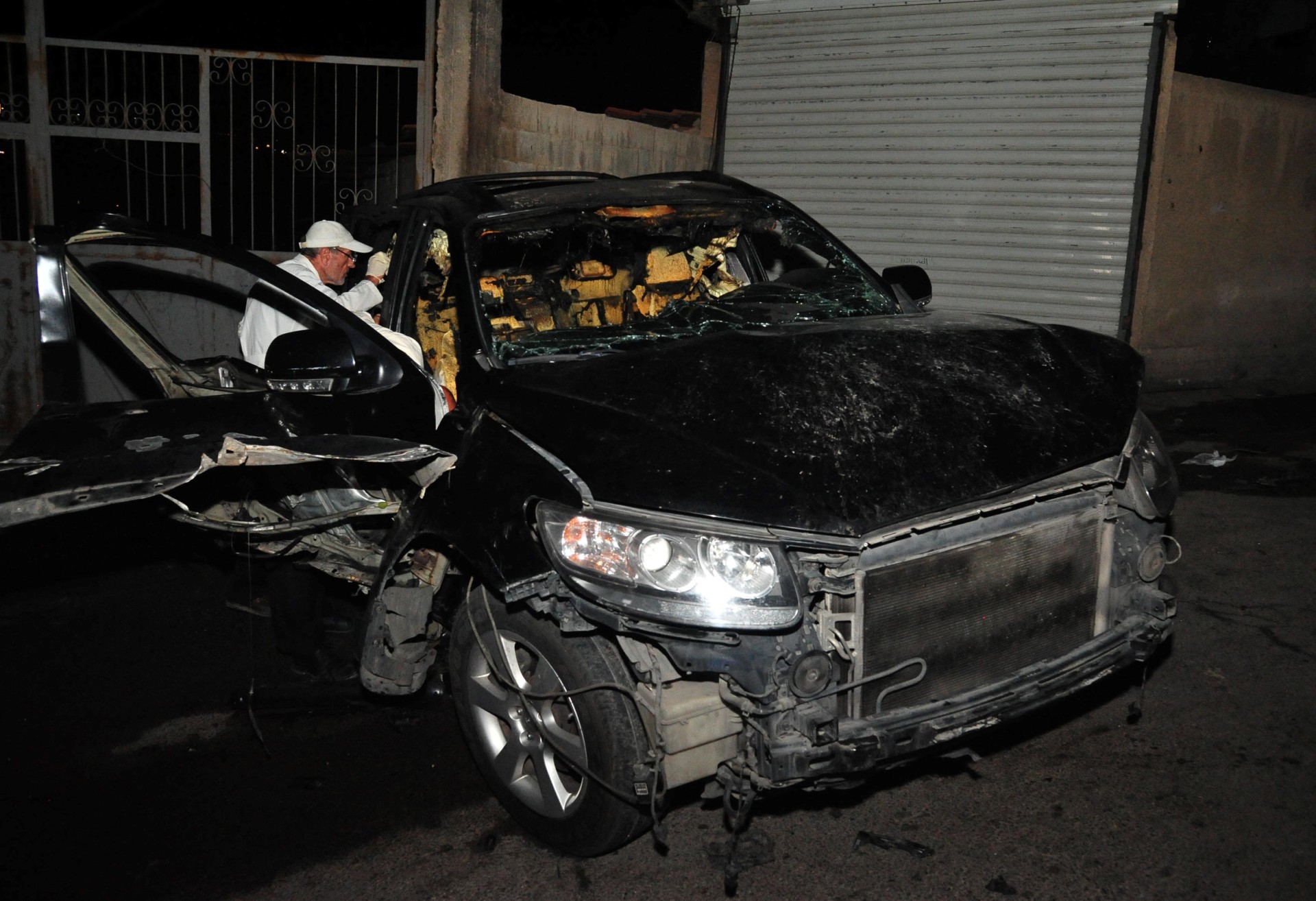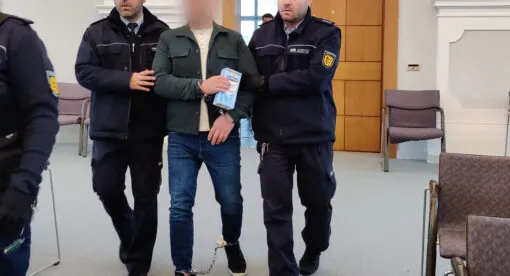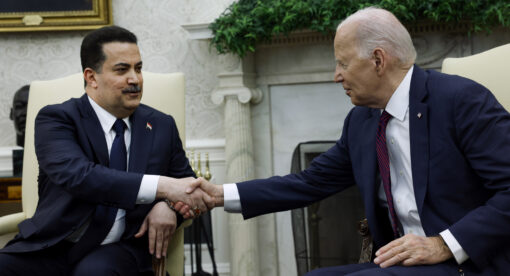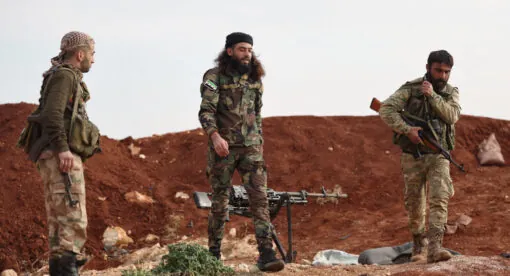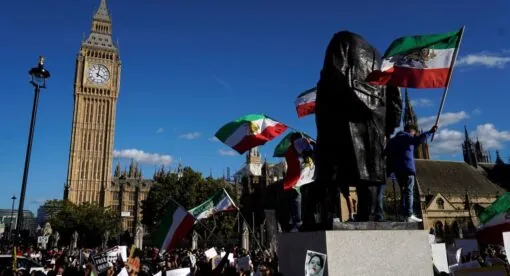The Oct. 22 assassination of Sheikh Mohammed Adnan Afyouni, one of Syria’s top Sunni religious leaders, has raised fears of a throwback to an earlier, bloodier phase of the Syria crisis – one where sabotage, targeted killings, and security infiltrations were frequent. Afyouni’s death, the highest-level targeting of a religious figure in seven years, presents wider implications for those with a history of involvement in Syria’s controversial “reconciliation” deals. It also points to the serious security gaps in the regime-controlled areas, which is a key vulnerability for Damascus, which is struggling to impose its writ on the country and improve economic conditions.
Afyouni, a senior mufti of Damascus and its countryside, was no stranger to the densely populated town of Qudsaya, which sits on Damascus’ western outskirts. It was perhaps the location of his most important legacy – and the area where he was killed by a car bomb. He could be seen at the height of the war around the Syrian capital brokering deals and promoting surrender agreements. His death has sent shockwaves through loyalist areas, with scarce information on who the perpetrators of the attack could be and why the sheikh was targeted, and puts the relationship between the political establishment and the religious authorities under the spotlight.
His death reiterates the many security challenges still facing the country and leaves a plethora of unanswered questions. Little is known about the true extent of his activities in the nine-year-long conflict in Syria. What is known is that he was a close confidant of Syrian president Bashar al-Assad and was at the forefront of efforts to fight the more extremist entities in the country and promote a subtle pro-government narrative within religious circles.
The Reconciliation Mufti
Approximately four years ago, Afyouni played an integral behind-the-scenes role in the “reconciliation” agreement in the then-rebel-held towns of Qudsaya and Hameh that saw hundreds of militants transported from the town to Idlib and the Syrian military presence restored. While other religious figures in the country such as Grand Mufti Ahmad Badreddin Hasoun or Minister of Religious Endowments Mohammed Abdul Sattar al-Sayed had been relegated to more symbolic and conventional roles, Afyouni was highly active on the ground. In hindsight, his efforts arguably saved Qudsaya and Hameh from an even worse fate than they endured.
The two towns’ proximity to the loyalist stronghold of Masaken al-Haras, or “Guards Housing,” where most Syrian army officers lived, and the presidential palace made them key areas to recapture, but the areas were ultimately retaken without using the type of brute force seen in other areas in the Damascus countryside.
Unlike other neighborhoods in east and west Ghouta such as Jobar and Daraya, which were attacked daily, resulting in extraordinary high levels of destruction, Qudsaya and Hameh remained relatively unscathed, and even when under rebel control they were bustling with inhabitants and a lucrative black market trade with government areas for daily necessities. Notably, many of the Palestinians who fled Yarmouk camp in southern Damascus in the thousands in 2013 relocated to Qudsaya. The main reason why Qudsaya and Hameh only witnessed a limited amount of destruction was down to two people in principle: Afyouni and Sheikh Adel Mesto, a religious leader in Qudsaya.
Both maintained strong relations with rebel factions and tribal elders while the towns were besieged, ultimately leading to the agreement that saw the conflict end there. Their roles also included difficult negotiations for the return of civilians who were serving with Syrian military and captured by rebels after entering Qudsaya to see their families. Syrian reporter Wesam al Tair noted how “every speck of dust and soul in Qudsaya and al-Hama mourns Sheikh Afyouni, who stood with his people and did not abandon them throughout the years of the war.”
Damascus-based journalist Ali Makhlouf, who followed Afyouni’s efforts, told the Newlines Institute that “Sheikh Afyouni had a major role in reconciliations during the eruption of the fighting areas in the Damascus countryside, and he also played a major role in the issue of reconciliation and settling the situation in Daraya, in addition to a number of areas such as Qaboun, Harasta, and Irbin.” Makhlouf said “there are questions that arise after the assassination of Sheikh Al-Afyouni, why was he assassinated? Simply those who have no interest in the existence of influential clerics who are closer to the government than the opposition.”
Afyouni would be a prime target for those seeking to damage Syria’s delicate social contract. As a firm al-Assad advocate, he held much sway with the conservative Sunni population in Damascus especially, and his death is a blow to the Syrian leadership’s efforts to stifle more extremist sections of the country. Afyouni’s importance was as a shield to calm sectarian tensions and because of his work on the front line of Damascus’ strategy to promote a deeply moderate version of Islam through his leadership of the “Sham International Islamic Center for Countering Extremism.” His targeting is an attempt to chip away at years of efforts to stabilize the country’s complicated and at times volatile socio-religious fabric.
The Syrian war has been touted as a popular majority Sunni struggle against a minority-led predominantly Alawite ruling system, but this simplistic assessment ignores the significant cross-religious attachments and ties of which Afyouni was a major part. The core Sunni strongholds of Damascus and Aleppo have been central to Assad’s strategy, and without the relative loyalty from the merchant class in both cities, the war would look different today.
No group has since claimed responsibility for Afyouni’s killing, but his reconciliation efforts had several critics, such as the Hayat Tahrir al-Shaam and other Islamist-leaning rebel factions, which viewed the agreements as surrender deals. People who have lost property, money, and potentially family members from the surrender deals could have sought revenge as well. As Syria’s economic and social crises continue, old scores could be settled with the dust still visible from Syria’s many hardships.
Future Implications
Afyouni was the third-most important religious authority in Syria and the highest-ranking figure assassinated since a suicide bomber killed influential Umayyad mosque imam Mohammed Ramadan al-Buti in 2013.
Tributes to Afyouni came in quickly. Syrian Minister of Endowments Mohammed Abdul Sattar was among hundreds of mourners who attended his funeral at the Umayyad mosque, where he stated, “No matter how hard they try through firepower and abhorrence, they would not be able to silence the voice of love which Sheikh Adnan projected across Damascus.” Yaroub Zaher Eddin, the son of slain Druze Gen. Esam Zaher Eddin, described Afyouni as a “martyr.”
No official investigation has been launched by the Syrian authorities, and there is scant information surrounding the assassination itself. What is known is that after finishing a sermon at the Sahaba mosque in Qudsaya, Afyouni went back to his car, which then exploded. No other individuals were reportedly with him, and given the fact that Qudsaya is a densely inhabited suburb, it would be extremely difficult to identify a culprit.
Unclaimed assassinations and car bombs harken back to an earlier phase of the Syrian conflict and prove that even some of the more important and shielded figures can still be targeted. Area control does not necessarily denote stability, and preventing such attacks, especially in more remote locations, is virtually impossible.
Despite the Assad regime regaining large swathes of territory, several predicaments remain, most notably concerning long-term stability and security in former opposition-held areas. Many of the reconciliation agreements saw opposition fighters leave, but some former fighters have still managed to return after a settlement with the relevant intelligence branches, while others never left in the first place and joined groups such as the National Defense Forces and local paramilitary forces. Splinter cell attacks and assassinations have regularly occurred, a reminder that the situation is not yet back to pre-2011 normality.
Afyouni’s killing will weaken socio-political and religious relations in Syria and sever an important link between the government and the masses. Military figures and politicians can be replaced, but it is almost impossible to create another Afyouni, in the same way that al-Buti was never truly replaced. Once that link has vanished, it creates complexities in an underreported and sensitive area of Syrian politics because despite adhering to a staunchly Baathist ideology, Syria’s establishment has strong religious tendencies.
Many of the top-tier officials are Sunni, from spymaster Ali Mamlouk to foreign minister Walid al-Muallem. Even Assad gives much precedence to religious symbolism, praying at a different mosque each Eid, and Syria’s ministry of religious endowments called for nationwide prayers after recent forest fires devastated much of rural Lattakia. Moving forward more, emphasis will likely be placed on promoting intra-religious tolerance and upholding Afyouni’s values as the void created by the cleric’s death remains.
The assassination of Sheikh Afyouni shows that regime-controlled areas remain vulnerable to major terrorist activities even though the broader insurgency has been largely put down. Assassinations like these target notable figures operating in the space between the state and the population. At a time when they are unable to revive an insurrection rebel factions will increasingly resort to such targeted killings of key individuals that the regime relies on. Such attacks hurt the regime when it is already grappling with dire economic conditions and is barely able to hold on to territories that it clawed back from the rebels during a civil war that will soon be a decade old.
Danny Makki is a non-resident scholar at the Middle East Institute covering the internal dynamics of the conflict in Syria. Makki specializes in Syria’s relations with Russia and Iran. He Tweets at @Dannymakkisyria.
The views expressed in this article are those of the author and not reflective of an official policy or position of the Newlines Institute.

